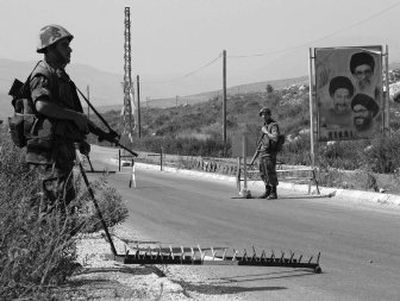Israel seeks to include friendly Muslim nations

JERUSALEM – The Israeli government said Saturday it is asking friendly Muslim countries to contribute troops to the U.N. force that is to help police the cease-fire in southern Lebanon between Israel and Hezbollah.
The U.N. wants Muslim troops included to lend credibility in the region to what so far is a mostly European force, and the predominantly Islamic nations of Indonesia, Bangladesh and Malaysia have offered to participate.
But none of those recognizes Israel, which says it would be reluctant to share intelligence with a force that included Muslim nations it doesn’t have relations with. While Israel does not have any veto, its opposition to a country could influence which troops are included.
Israeli Foreign Ministry spokesman Mark Regev said Israel had spoken to the governments of several Muslim nations with which it has diplomatic relations, but primarily to Turkey. Turkey, which would be acceptable to all parties, has not decided whether to join the mission.
“If Turkey decides to send a contingent, we would welcome that,” Regev said.
He did not specify the other nations contacted by Israel, but Jordan and Egypt are among the Muslim countries that Israel has relations with.
The difficulties facing the nascent force were already apparent, with a top Hezbollah official saying in a defiant interview published Saturday that the Shiite Muslim guerrilla group would keep its weapons despite international pressure to disarm.
Sheik Naim Kassem, the group’s deputy leader, also told the Lebanese newspaper An-Nahar that Hezbollah’s “resistance” to Israel would continue. “Justifications for ending it do not exist,” he said.
Kassem’s remarks underscored the fragility of the U.N.-brokered cease-fire.
Five Lebanese, included four children from the same family, were wounded by cluster bombs left over from the Israeli offensive. They exploded in two southern Lebanese villages on Saturday, Lebanese security officials said.
Separately, a Lebanese shepherd was wounded when another cluster bomb exploded in the border village of Aitaroun, less than three miles south of Blida.
Since the U.N.-brokered cease-fire took hold Aug. 14, eight Lebanese have been killed by exploding ordnance, including two children, and 38 people have been wounded
The cease-fire stipulates the deployment of the U.N. force along Lebanon’s border. The international force is to reinforce the Lebanese army, which is moving 15,000 soldiers of its own into the south. The troops are Lebanon’s first assertion of central authority in the south in decades.
European Union nations pledged 6,900 soldiers Friday, dispelling concerns the peacekeeping force might not materialize because of reluctance to send troops without clear instructions or authorization to use their weapons. But the force was still far short of the 15,000 soldiers envisioned under the U.N. resolution.